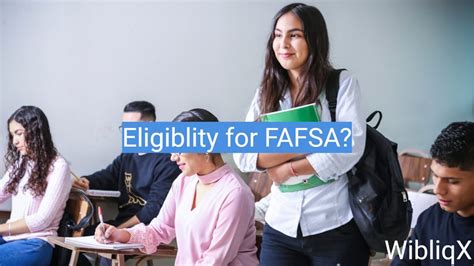Completing the Free Application for Federal Student Aid (FAFSA) is a crucial step in securing financial aid for higher education in North Carolina. The FAFSA is a critical document that helps determine a student's eligibility for federal, state, and institutional financial aid. In this article, we will delve into the world of FAFSA in North Carolina, providing you with everything you need to know to navigate the process successfully.
Understanding the Importance of FAFSA in NC
The FAFSA is a vital document that helps students in North Carolina access various forms of financial aid, including grants, loans, and work-study programs. By completing the FAFSA, students can unlock a range of benefits, including:
- Federal Pell Grants: Need-based grants that help undergraduate students pay for college
- Federal Direct Loans: Low-interest loans that help students finance their education
- Federal Work-Study (FWS) Programs: Part-time jobs that help students earn money while pursuing their education
- State-based aid: North Carolina offers various state-based aid programs, including the North Carolina Student Grant and the North Carolina Education Lottery Scholarship

Who is Eligible to Complete the FAFSA in NC?
To be eligible to complete the FAFSA in North Carolina, students must meet certain requirements, including:
- Be a U.S. citizen or eligible noncitizen
- Have a valid Social Security number
- Be enrolled or accepted for enrollment in a degree-granting program
- Not be in default on a federal student loan or owe a refund on a federal grant
- Not have been convicted of a crime involving the possession or sale of illegal drugs
How to Complete the FAFSA in NC
Completing the FAFSA in North Carolina is a relatively straightforward process. Here's a step-by-step guide to help you get started:
- Gather required documents: Before starting the FAFSA, make sure you have the following documents:
- Social Security number
- Driver's license
- W-2 forms
- Tax returns (if applicable)
- Information about your income and assets
- Create an FSA ID: The FSA ID is a username and password that you'll use to log in to the FAFSA website. Create an FSA ID on the Federal Student Aid website.
- Start the FAFSA application: Go to the FAFSA website and click on "Start A New FAFSA." Enter your FSA ID and password to log in.
- Complete the demographic information: Provide your personal and demographic information, including your name, address, and date of birth.
- List your schools: Enter the names of the colleges or universities you're interested in attending.
- Complete the financial information: Provide information about your income, assets, and expenses.
- Review and submit: Review your application carefully and submit it.
Tips and Tricks for Completing the FAFSA in NC
- Complete the FAFSA early: The FAFSA becomes available on October 1st each year. Complete it as early as possible to ensure you don't miss out on financial aid.
- Use the IRS Data Retrieval Tool: The IRS Data Retrieval Tool can help you import your tax information directly into the FAFSA.
- Don't wait for your taxes to be filed: You can estimate your tax information and update it later if necessary.
- List multiple schools: List all the colleges or universities you're interested in attending to ensure you receive financial aid from each institution.

Common Mistakes to Avoid When Completing the FAFSA in NC
- Missing deadlines: Make sure you complete the FAFSA by the deadline to ensure you don't miss out on financial aid.
- Inaccurate information: Double-check your application to ensure you've provided accurate information.
- Not listing all schools: List all the colleges or universities you're interested in attending to ensure you receive financial aid from each institution.
- Not using the IRS Data Retrieval Tool: The IRS Data Retrieval Tool can help you import your tax information directly into the FAFSA.
What Happens After You Submit the FAFSA in NC?
After you submit the FAFSA, the U.S. Department of Education will process your application and send you a Student Aid Report (SAR). The SAR will summarize the information you provided on the FAFSA and provide you with an Expected Family Contribution (EFC).
- Review your SAR: Review your SAR carefully to ensure it's accurate.
- Correct any errors: If you find any errors, correct them and resubmit your application.
- Receive your EFC: Your EFC will determine your eligibility for federal, state, and institutional financial aid.

Conclusion
Completing the FAFSA in North Carolina is a crucial step in securing financial aid for higher education. By understanding the importance of the FAFSA, who is eligible to complete it, and how to complete it, you can unlock a range of benefits, including grants, loans, and work-study programs. Remember to complete the FAFSA early, use the IRS Data Retrieval Tool, and list multiple schools to ensure you receive financial aid from each institution.
Gallery of FAFSA in NC





FAQ Section
What is the deadline to complete the FAFSA in NC?
+The FAFSA deadline in NC is June 30th of each year. However, it's recommended to complete the FAFSA as early as possible to ensure you don't miss out on financial aid.
What is the Expected Family Contribution (EFC)?
+The EFC is a number that determines your eligibility for federal, state, and institutional financial aid. It's calculated based on the information you provide on the FAFSA.
Can I complete the FAFSA if I'm not a U.S. citizen?
+Yes, you can complete the FAFSA if you're an eligible noncitizen. However, you'll need to provide documentation to prove your eligibility.
